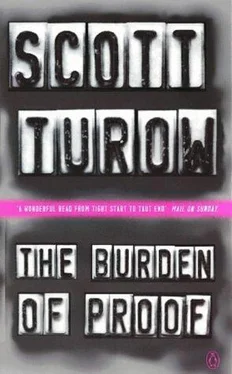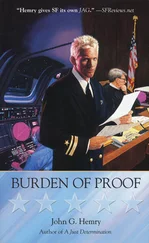Scott Turow - The Burden of Proof
Здесь есть возможность читать онлайн «Scott Turow - The Burden of Proof» весь текст электронной книги совершенно бесплатно (целиком полную версию без сокращений). В некоторых случаях можно слушать аудио, скачать через торрент в формате fb2 и присутствует краткое содержание. Жанр: Детектив, на английском языке. Описание произведения, (предисловие) а так же отзывы посетителей доступны на портале библиотеки ЛибКат.
- Название:The Burden of Proof
- Автор:
- Жанр:
- Год:неизвестен
- ISBN:нет данных
- Рейтинг книги:3 / 5. Голосов: 1
-
Избранное:Добавить в избранное
- Отзывы:
-
Ваша оценка:
- 60
- 1
- 2
- 3
- 4
- 5
The Burden of Proof: краткое содержание, описание и аннотация
Предлагаем к чтению аннотацию, описание, краткое содержание или предисловие (зависит от того, что написал сам автор книги «The Burden of Proof»). Если вы не нашли необходимую информацию о книге — напишите в комментариях, мы постараемся отыскать её.
The Burden of Proof — читать онлайн бесплатно полную книгу (весь текст) целиком
Ниже представлен текст книги, разбитый по страницам. Система сохранения места последней прочитанной страницы, позволяет с удобством читать онлайн бесплатно книгу «The Burden of Proof», без необходимости каждый раз заново искать на чём Вы остановились. Поставьте закладку, и сможете в любой момент перейти на страницу, на которой закончили чтение.
Интервал:
Закладка:
"Maybe he has something to tell us."
"Immunity is a possibility?"
"I think so." Klonsky once more glanced downward; she was saying too much. "I understand your interest, Sandy. But this would be more appropriate with whoever represents him.
As I say, this is a courtesy to you. Start didn't want another incident like the one at your home."
"Most considerate," said Stern. "My thanks to both of you."
He did not wish to sound particularly curt, but he was experiencing a fading lack of control.
Ms. Klonsky looked at him sadly. He could see who he was to her-a home-wrecked widower with one more enormous family problem. He had her sympathy, which was not at all what he had come here expecting to obtain.
Outside the U.S. Attorney's Office, the elevator arrived, opened, and then refused to move. Stern, still spinning with anger, threw down his empty cases and pounded on all the buttons. Up. Down. Door open. Door close: The new federal building had been completed ten years ago, with every contract sprinkled- down on cronies from the fingertips of Mayor Bolcarro like a confectionery topping.
The structure had been intended as a courthouse, but the judges, after a brief period of occupancy, issued various orders and injunctions and moved themselves back into the ancient Federal Square building across the street. Nothing here worked. The elevators. The heat. The windows popped out in high winds or low temperatures and showered glass off the pedestrians below. It had taken six years to complete con-stmction, and the litigation was still ongoing a decade later. The architect, the engineers, the general contractor, and virtually every tradesman who had touched the place were co-plaintiffs, co-defendants, or crossparties in four or five separate suits. Now and then, Stern would see the herd of lawyers arrive for the various status calls. They would stand before the judge, twenty and thirty abreast, and bicker. In the meantime, the building grew so brisk during the occasional periods of Arctic cold that gripped this city that one federal judge, during the short period when court had been held here, mounted the bench in mittens and instructed the lawyers that they were not required to remove their hats.
At last, the steel box began to move. After the delay, it stopped at every floor. Stern, who had an appointment to meet Lieutenant Radczyk for lunch, simmered at the edge of outburst. Dixon. John. Gevalt.
What an ugly mess his brother-in-law had made!
Headed down, with lunch at hand, the tiny space was jammed.
The elevators, naturally, had been stintingly designed, too small for the bu'fiding's population. In his state of high agitation, crashed against the rear partitions, Stern took an instant to react when a woman in front of him, a tall brunette in her thirties, stepped back and made contact.
Indeed, that put matters somewhat delicately, for she had not merely brushed against him or inadvertently driven her spike heel into his toes. Rather, this young woman had laid the cleave of her rear end firmly against his hand. And would the Sandy Stern of a month ago have politely pulled away? No question. Today he remained still; he was certain that she took him for the wall. But at the next stop the elevator stuttered on its cable, minutely rocking. And did she ease back even farther? So it seemed. And did Stern, as the floors went by, find himself, almost involuntarily, inching his hand by the most subtle degree? He did. He did, so that by floor 4, his fingers, two or three, were delicately pressed against the parting of her buttocks and the filmy folds of her green dress and the elastic ridges of her undergarments below. By the natural movement of the car, this arrangement provided the most discreet stroking each time the elevator jolted to a halt.
From behind, Stern tried to study this young woman. Was she one of his casual courthouse acquaintances, another lawyer having fun in an offbeat fashion? He did not recogn'tze her: Her eyes were green; one cheek was blemished. A professional person, he assumed, in an expensive green silk dress, carrying her briefcase. With each stop, she seemed to lean back a little more. Her jaw was set in a largely abstracted manner, but save for paralysis, there was no way she might not have noticed what was occurring. At the ground level, she let all her weight come back into him, so that for the briefest instant his hand fit snugly inside and-possible?-was vaguely squeezed before she stepped forward to exit.
Across the metal threshold, she looked about for hearings, and when her view crossed his, her expression was far too indefinite to be called a smile.
Hiking away, she reached back and gave a quick jerk at her skirt to free it from the rear cleavage where the material was gathered.
Dizzy and aroused, impressed, even inspired by this boldness, Stern followed her from the elevator. So this was the life of men and women in the modern day! It was Cincinnatus who was called back to battle from the plowfield, -rearmored, remounted, and placed in charge of war and strategy. That was Stern-except that Cincinnatus had been a hero and an officer in his youth and Stern was never more than a buck private. He'd had more diverse sexual experience in the last four days than in his entire prior lifetime. And there was no hiding his pleasure from himself. His sweet interlude with Margy had revived him like a dose of water on a thirsting plant-he felt the strength of his own vitality from root to leaf. No wonder people so easily made fools of themselves. If he'd never known, he did now-this was fun. How did one pursue these leads? Coffee. A hotel room? What happened next? Amazed by himself, still toting his cases, he actually followed the young woman for a block before he recalled Radczyk. She never once looked back; apparently, she took her gratification from teasing. And yet, even when he'd stopped, he had no sure knowledge of his own capacities. He did not know what excesses were within him; he might sprout wings and fly, he might dance naked in the intersection. He felt like some soaring bubble, a thin surface containing the exciting weightlessness of freedom.
By the Kindle River, near the docks on the Kewah-nee side, an underground world had grown up. Stern always marched down the iron stairwell from the boulevards above with a sense of significant descent, somehow related to entering darkness in the daytime. These piers where the bargemen would unload their cargoes of fruit, rice, and coal brought up from the South retained an economic importance for Kindle County well into this century. In the 1920s, the local movers and shakers, full of the improbable hope that the tri-cities, like an urban Cinderella, could be made to resemble Paris, decided to pretend the docks were not here.
On concrete pilings driven down into the sandy banks of the Kindle, the downtown section of Ke-wahnee was extended; great roads were built and modest skyscrapers rose.
Beneath, the gritty dockmen and barge hands continued to.work in a netherworld barely reached by daylight, while the suit-and-tie crowd rushed about above, dealing, suing, buying and selling the labor and commodities being delivered to the city in the dark below.
These days, Lower River, as this area was known, was eerie with the garish yellow glow of sulfur lamps. Abutting the streets, the docks of the trucking concerns which had located here originally to carry off what the barges brought and which eventually had supplanted them were littered with crates and spoiling produce. The air sang with the racing pitch of fires on the roads above and the windy commotion of that traffic. For many years, this was the locale where bodies were dumped and drug deals done.
The flow of hot merchandise across the tracking piers, by rumor, was still steady. In his early years in practice, Stern was always going about down here to visit one crime scene or another. A thousand people passing by and nobody knew nothin'. The situation was usually far more frustrating to the police than to Stern.
Читать дальшеИнтервал:
Закладка:
Похожие книги на «The Burden of Proof»
Представляем Вашему вниманию похожие книги на «The Burden of Proof» списком для выбора. Мы отобрали схожую по названию и смыслу литературу в надежде предоставить читателям больше вариантов отыскать новые, интересные, ещё непрочитанные произведения.
Обсуждение, отзывы о книге «The Burden of Proof» и просто собственные мнения читателей. Оставьте ваши комментарии, напишите, что Вы думаете о произведении, его смысле или главных героях. Укажите что конкретно понравилось, а что нет, и почему Вы так считаете.












